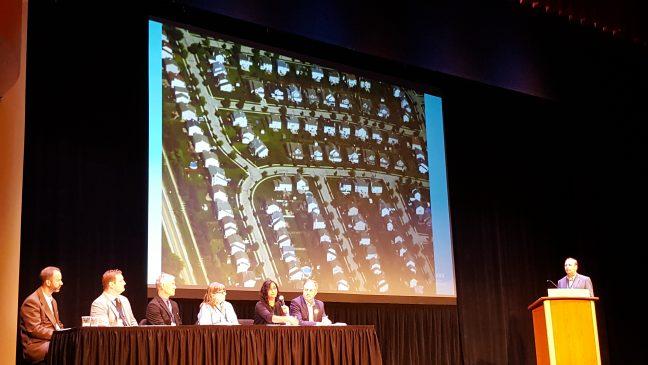Businesses have a lot to gain in going green, panelists said Tuesday at the Wisconsin Union Theater in Memorial Union.
To celebrate its 20th year as a nonprofit, the Wisconsin Environmental Initiative hosted two speakers and a panel of individuals working locally in everything from academics to government, business and nonprofits to illustrate how sustainable practices and partnerships can be profitable.
The headlining speakers, co-authors Joel Makower and retired Marine Col. Mark “Puck” Mykleby, drew from their recently-published book “The New Grand Strategy: Restoring America’s Prosperity, Security and Sustainability in the 21st Century” for the event titled “Doing Well by Being Good.”
Mykleby grew up in rural Minnesota and attended the Naval Academy before joining the Marines, while Makower grew up near San Francisco, attended the University of California- Berkeley and became an entrepreneur. The two presenters drove home the point that, while they came from polar opposite backgrounds, both had come to the same conclusion: To address the current challenge of sustainability in the United States, every industry needs to come together and find innovative ways to work together to re-imagine the current economy.
“I’m a big proponent of the saying ‘if you want a new idea, read an old book,’” Mykleby said, pointing back to the 1930s when Franklin D. Roosevelt approached the private sector and asked them to innovate solutions for the Great Depression.
Mykleby and Makower said there are three large demands in civilization today: walkable communities, more sustainable agriculture and the need to conform to constraints of our physical resources. This planet can only support so many consumers.
One of the local panel members, Dave Cieslewicz, executive director of WI Bike Fed, mentioned how millennials and baby boomers are starting to look for their communities. They want walkable cities and to not be trapped in isolating suburban homes, he said.
Cieslewicz said there’s an opportunity to address this, to redevelop around the kind of cities people want to live in. Currently, a third of U.S. cities are allocated to parking, but because of the “sharing economy” trend — in which people are more likely to use apps like Über instead of owning a car, for example — those spaces could be redeveloped.
Jeffrey Thompson, executive advisor & CEO emeritus for Gundersen Health Systems, said his business not only drastically reduced its carbon emissions, but also decreased the cost of delivering care to patients.
“Gundersen is doing well, don’t tell me it can’t be done,” Thompson said.
Gundersen, Thompson said, made a conscious decision to take 5 percent of the money it would have invested in Wall Street and instead invested it in the local community, like the Hennepin County landfill and transfer station. Gundersen also powers its health systems through locally supplied renewable energies.
A 10 and 12 percent, those investments actually gave a higher rate of return than a traditional investment would have, Gundersen said.
“We’re not the biggest name, we don’t have the most money, but we did something different with our money,” Thompson said. “You look for partners who value the same set of things you do and you can accomplish great things.”


